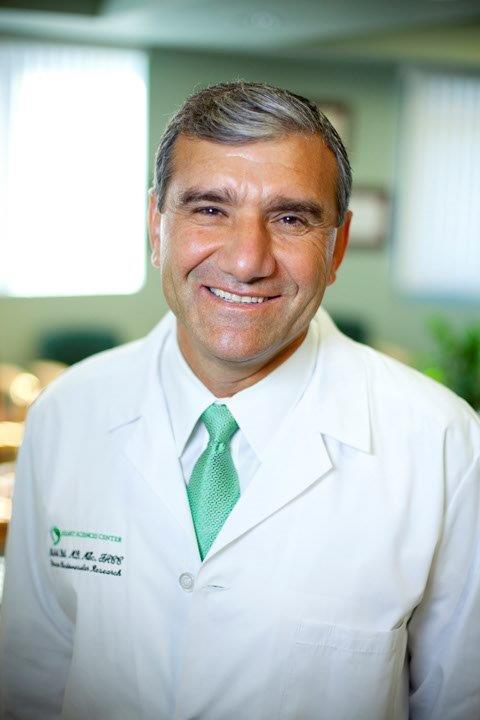
By Deborah Hilcove
Tempe resident Bob Benton says he owes his life to Dr. Nabil Dib.
“I retired from the corporate world. Motorola. Harley Davidson. Eagle Rider. Invented, patented some things—a flat screen monitor, a networking program—started, sold some companies,” Benton said. “Did some consulting. But I retired. Was aiming to qualify for the Senior Men’s Amateur Golf Tournament. So I was playing a lot of golf.
“It was November, three years ago, in the afternoon. I was playing alone. I hit into the sand trap on the sixth hole, getting ready to chip it out onto the green when I felt weak, lightheaded, a pain in my chest. I knew, ‘Uh-oh. Heart attack.’
“I managed to get back into my golf cart, back to the clubhouse, drove myself home. EMTs arrived in minutes, took me to Banner Hospital. Dr. [Faisal] Bahadur was the cardiologist on call, looked at the tests: A widow maker.
“At that time,” Benton says, “three arteries were blocked. “He got me immediately into surgery, and instead of a triple bypass, put in stents. All these things were right—the right guy at the golf course, the EMTs, Dr. Bahadur on call, the surgery within half an hour. If anything had been different, I might not be here.”
Despite its name, a “widow maker” heart attack also affects women. Survival might be minutes or several hours, but this type of heart attack is one of the deadliest because the left anterior descending coronary artery becomes blocked. Since it’s the beginning of the blood course, the whole artery fails. Immediate treatment is critical.
“I was always athletic,” Benton says. “Competitive swimming, sports. But I had all the markers for a heart attack—used to smoke, drink, the whole corporate thing—had hypertension, stress from building companies.
“I figured I’ve got a lot of livin’ to do. My water and snow skiing days are over. Surfing, too. But sitting on the couch, watching soap operas—that’s not my gig.”
Bahadur suggested Benton might be a candidate for a study conducted by Dr. Nabil Dib, the Director of Cardiovascular Research at Dignity Health Medical Group in Gilbert. Dib is internationally known for stem cell research.
Benton researched everything he could find online, read books, asked questions. He didn’t qualify for Dib’s first cardiovascular study, but soon was accepted for another study, transplanting matrix tissue—or cardiac “scaffolding”—into a damaged heart, regenerating it into a functioning, healthy heart.
Benton explains, “Stem cell tissue is injected into the heart allowing it to reconstruct the damage. I was the first patient for this [matrix] procedure. It took about two hours. I was awake during it.”
A tiny catheter, patented by Dib, was inserted through the groin and into the heart, guided by 3-D technology. Stem cells and matrix were then injected through the catheter. Since the pig heart is like a human heart—so similar that faulty human heart valves are routinely replaced with those from pigs—porcine stem cells were used.
Benton checks in frequently with Bahadur and Dib for imaging to track the therapy and measure the heart’s response. He says, “I feel better now than before. I mow the lawn, take care of the pool. I love to swim—was a competitive swimmer when I was younger—I swim 100 yards breast stroke and 100 yards freestyle three times a week. I play golf, walk when it’s cooler, use a cart in the summer.” He laughs and adds, “Funny thing now, though, I have an urge to date Miss Piggy!”
Dib, President and Founder of the International Society for Cardiovascular Translational Research (ISCTR), believes that information about cardiovascular research “should be international.” It is “translational,” he says, “because the program is concerned with bringing the product to the patient, the concept to the patient. We’re integrating the patient’s voice with healthcare.”
To accomplish this, the ISCTR website features a portal for cardiovascular patients to access a survey for various treatment options. That survey, part of the ISCTR program called “Patients Voice,” will be shared with decision-makers in science, regulatory agencies and the medical industry, giving patients a healthcare voice. The site can be accessed at www.isctrpatientsvoice.org.
Benton, a Patients Voice board member, says, “We want one million patients to join the webpage.” He explains that “not a lot of people know about these research projects, how to get selected” and says Patients Voice will share this information.
“We want Gilbert to be the heart of cardiovascular research,” he says. “We need supporters to step up to the plate. Funding is essential.” Benton raises his voice, leans forward intently, “We’re going to save lives. Going to save lives.”
An event sponsored by Dignity Health Medical Group will feature Dr. Dib addressing “Stem Cell & Advanced Treatment for Heart Failure” on Wednesday, September 12, from 5-7 p.m., at 3420 S. Mercy Road in Gilbert. Reservations are requested by Monday, September 10. Call (877)-728-5414 or register online at dignityhealth.org/AZCE.

